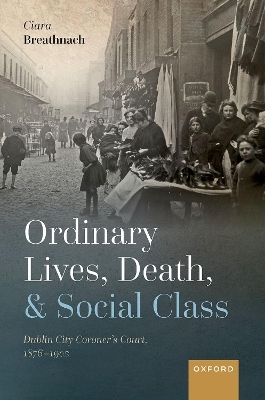
Ordinary Lives, Death, and Social Class
Dublin City Coroner's Court, 1876-1902
Seiten
2022
Oxford University Press (Verlag)
978-0-19-886578-0 (ISBN)
Oxford University Press (Verlag)
978-0-19-886578-0 (ISBN)
Ordinary Lives, Death, and Social Class focuses on the evolution of the Dublin City Coroner's Court in the late nineteenth century, using a wealth of inquest data to understand the impact of urban living from lifecycle and class perspectives, revealing histories from both above and below.
Ordinary Lives, Death, and Social Class focuses on the evolution of the Dublin City Coroner's Court and on Dr Louis A. Bryne's first two years in office. Wrapping itself around the 1901 census, the study uses gender, power, and blame as analytical frameworks to examine what inquests can tell us about the impact of urban living from lifecycle and class perspectives. Coroners' inquests are a combination of eyewitness testimony, expert medico-legal language, detailed minutiae of people, places, and occupational identities pinned to a moment in time. Thus they have a simultaneous capacity to reveal histories from both above and below. Rich in geographical, socio-economic, cultural, class, and medical detail, these records collated in a liminal setting about the hour of death bear incredible witness to what has often been termed 'ordinary lives'. The subjects of Dr Byrne's court were among the poorest in Ireland and, apart from common medical causes problems linked to lower socio-economic groups, this volume covers preventable cases of workplace accidents, neglect, domestic abuse, and homicide.
Ordinary Lives, Death, and Social Class focuses on the evolution of the Dublin City Coroner's Court and on Dr Louis A. Bryne's first two years in office. Wrapping itself around the 1901 census, the study uses gender, power, and blame as analytical frameworks to examine what inquests can tell us about the impact of urban living from lifecycle and class perspectives. Coroners' inquests are a combination of eyewitness testimony, expert medico-legal language, detailed minutiae of people, places, and occupational identities pinned to a moment in time. Thus they have a simultaneous capacity to reveal histories from both above and below. Rich in geographical, socio-economic, cultural, class, and medical detail, these records collated in a liminal setting about the hour of death bear incredible witness to what has often been termed 'ordinary lives'. The subjects of Dr Byrne's court were among the poorest in Ireland and, apart from common medical causes problems linked to lower socio-economic groups, this volume covers preventable cases of workplace accidents, neglect, domestic abuse, and homicide.
Ciara Breathnach is Associate Professor in History at the University of Limerick where she has worked since 2005. She is currently an Irish Research Council Laureate Awardee (2018-2022) and has published widely on Irish socio-economic, gender, cultural, and health history.
Introduction
1: Dublin, the City Coroner's Court, and the Everyday
2: Sudden and Accidental Deaths in Domestic Settings
3: Deaths Outside: Public and Workplace Settings
4: Unnatural, Suspicious, and Violent Death
Conclusion
| Erscheinungsdatum | 24.06.2022 |
|---|---|
| Zusatzinfo | 31 black and white figures/illustrations |
| Verlagsort | Oxford |
| Sprache | englisch |
| Maße | 162 x 240 mm |
| Gewicht | 588 g |
| Themenwelt | Geschichte ► Allgemeine Geschichte ► Neuzeit (bis 1918) |
| Geisteswissenschaften ► Geschichte ► Regional- / Ländergeschichte | |
| Geschichte ► Teilgebiete der Geschichte ► Kulturgeschichte | |
| Geschichte ► Teilgebiete der Geschichte ► Sozialgeschichte | |
| ISBN-10 | 0-19-886578-3 / 0198865783 |
| ISBN-13 | 978-0-19-886578-0 / 9780198865780 |
| Zustand | Neuware |
| Informationen gemäß Produktsicherheitsverordnung (GPSR) | |
| Haben Sie eine Frage zum Produkt? |
Mehr entdecken
aus dem Bereich
aus dem Bereich
Giordano Bruno - ein ketzerisches Leben
Buch | Hardcover (2024)
C.H.Beck (Verlag)
CHF 41,85


